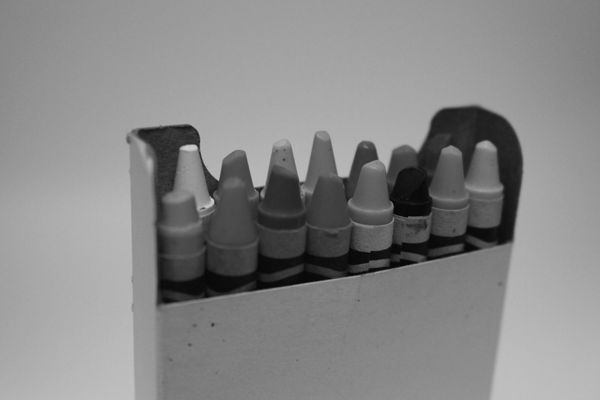Not The Brightest Crayon In The Box
1. A derogatory expression used to describe someone who is not very smart or who is dumb.
It’s been heard and said in and outside of the classroom, but many question what it really means. It is used to describe somebody who is lacking in knowledge or incomparable to others, placing them under a title that is looked at as disadvantaged. But how does the phrase “Not The Brightest Crayon in the Box” really play a role in the context it is used in?
At an average American high school, some of the first things running through the mind of a student are their standardized test scores, overall Grade Point Average (GPA), midterm grades, upcoming sports tournaments and social life. Many would say these are the types of ideals that revolve around the mind of an academically-motivated or average student. But where does one fit in when these aren’t on the hitlist of their everyday thoughts? Antioch Community High School holds a wide selection of students that come from different backgrounds, have a variety of interests and pursue different goals in life, but many still attain a judgeful mindset that places people in categories. These categories are based off of the only thing visible to the public: achievement.
In the school, work and retirement atmospheres, how are people placed on the spectrum of someone’s mind? In these situations, which are primarily dealt through social interaction, people immediately gain perspective on others based off of class placement, job titles and retirement benefits. For example, when a student progresses through his high school career in the Advanced Placement classes and honors programs, he gains a new perspective when stuck into the crowd of average-level students. This immediate perception is oftentimes a negative definement. Though it is the student placing a title on others, it is the success-orientated foundation that he grew up with that causes this reaction.
Today’s society projects high, informal standards on intelligence, success and achievement. Instead of encouraging students to pursue their personal passions and interests, society oftentimes transforms the meaning of “accomplishment” into one that is built on credit. This credit may be academic, athletic or music-based, but all amounts to one thing: a title. Because of this, students who don’t quite “meet the standards” are left in a situation of degradation where they are defined as lesser and secondary to those around them. Not only does popularity chain high demands on students and their performance, but the aura of cut-throat success that holds such as strong foundation in society promotes this merit-based system of definement.
“Most students think they have to make lots of money and have lots of things to be successful,” senior Jacob Dallago said.
Although this continues to be a norm, success isn’t all based off of the point system. There are different types of “bright crayons” in the box. While many feel the upcoming generation is becoming more open to unique interests, it is this openness that diversifies a group of people. The perfectionist thought of a straight-A, future engineering student is simply impossible for all to meet, and limiting. This is because everyone has their own unique characteristics that give them a passion or talent in a certain area. Dallago feels that the reprimanding standards found today project a false statement of achievement. Different from the average Sequoit, he enjoys the trades and takes part in courses at College of Lake County to pursue this passion. Although Dallago doesn’t live up to the AP and honors tracks set out by many, he succeeds in areas such as welding, automotive electricianing and mechanical engineering.
“When pressured to perform well on something I find irrelevant, I get aggravated,” Dallago said. “But when it is something I see as important, I want to do as good of a job as I possibly can.”
There is a need for success in all areas, making one defining path exclusive towards those who don’t follow. In the end, the test scores received in school do not show the talent of students, yet are merely a minute snapshot of a child’s very complex learning profile. It is important for students to discover what they are gifted at and pursue that in their future rather than focus solely on intelligence levels given by tests. Academic tests tend to hide the unique gifts that kids have and overshadow their importance in today’s society.
I strongly believe everyone is the brightest crayon in their own way but are not always recognized for their contributions,” senior Casey Bala said
Positive motivation is the solution to maintaining a more creative and stress-free environment for students, allowing them to focus less on beating those around them and more on pursuing their passions and enjoying their future. As new technology, discoveries and academics drive students in the face of today’s society, a reliance and push that is less on academic achievement and more on the pursuing of talents will further encompass success in the world that is caused not by pressure, but by individual creativity and perseverance.
The knowledge of potential encourages kids to pursue things that they enjoy, leading them to work harder and have more motivation in conquering skills they are gifted at. They need to discover their hidden talents, which will ultimately help the future as it causes those working to have a passion for what they do and be good at it instead of working for money and successful titles.
“Yes, I think that I am defined by my success,” Bala said. “But failure can lead to this fundamental success; it just takes hard work and determination.”
The truth is that there is a wide variety of bright crayons in the box. They come in all colors, careers and characteristics. They embrace their differences and encourage those around them as they pursue individual passions. Although criticism and one-sided standards will continue to remain present in the education system, workforce and everyday life, there is more behind each person and what they represent. “Not the Brightest Crayon in the Box” shows the need for others to open their eyes to the qualities that make each individual especially bright in their own, unique way.


